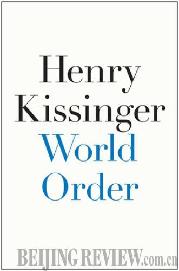|

Since the late 1970s, China has been integrating itself into the current international order rather than challenging it. Kissinger makes an analysis of contemporary China's dual mindsets toward the existing international order. On the one hand, the reform and opening-up policy initiated by late Chinese leader Deng Xiaoping has helped push China onto the global stage, and transform it into the world's second largest economy within the span of one generation. On the other, China has been forced to accept international norms, rules and responsibilities. The country is awaiting the arrival of changes while at the same time, it is becoming increasingly active in the international sphere and undertaking an increasing number of obligations. The country now shares more instead of fewer commonalities with the rest of the world. Kissinger's judgment is that China's rise in the 21st century is the result of the marriage between an ancient civilization and a contemporary international system, rather than a case of one world order oppressing another.
Despite differences in the two countries' respective concepts of world order, China and the United States still share things in common. In the book, Kissinger expounds on the differences and similarities between the two countries' ways of looking at the world. As indispensable pillars in maintaining world order, China and the United States have arrived at divergent judgments of the current system, but both bear their respective obligations. When it comes to the issue of how to maintain a lasting relationship with each other, both countries sorely lack experience and precedents. China possesses a similar territorial size and economic scale to the United States, but it has a different domestic model of governance. Americans prefer direct reactions to the current environment, while the Chinese tend to concentrate on gradual changes. Americans are used to formulating a detailed agenda to tackle issues, whereas the Chinese are more accustomed to proposing a major fundamental principle that can guide the process of solving problems. Both the Chinese and the Americans believe they are exceptional in the world, and it is only in recent years that the two countries have had to get used to sharing the same international space. Regardless of whether these two become rivals or partners, they will impose a significant influence on the formation of the world order in the 21st century.
Notably, both countries are trying to avoid strategic conflicts, with a view to pushing forward the "new model of major power relationship." Owing to China's rapid rise, international commentators often express doubts if the United States will be able to avoid repeating historical tragedies. Kissinger believes, by putting forward that new vision, the two countries have suggested a strategy that may represent the only conceivable way of preventing this from happening. Leaderships in both countries have admitted that the two countries share common interests and are trying to build up a strategic partnership in the Pacific region. Both are committed to building a constructive world order from the ground up.
Kissinger's understanding of the "new model of major power relationship" is a combination of a balance of power and partnership among big powers. Although it somewhat differs from China's principles of "non-conflict, non-confrontation, mutual respect and win-win cooperation," his thinking is probably redolent of a shift from the United States' old mentality, which features over-dependence on a system of accruing allies.
Kissinger does not shy away from talking about the possibility that the two countries might make divergent choices with respect to the international order. A series of huge hindrances must be removed in order to avoid a tense relationship between the established superpower and the rising power. Kissinger points out that the rebalance of the Asia-Pacific region should not be defined by military factors, and boundaries should not be largely decided by military deployments. Also, persistent U.S. attempts to promote "democracy" and "universal values" in Asia may fuel tensions between China and the United States. Kissinger's suggestion is that even if no compromises can be achieved in determining the course that the international order will take, the leaderships of both countries are obligated to prevent the differences from slipping into strategic confrontations.
It could be argued that Kissinger's suggested strategic adjustments and innovative thinking on the subject of the emerging new world order could help reduce and even eradicate the two countries' strategic differences, so as to place the ongoing transformation in the Asian order and the world order on a stable and progressive route. More specifically, the possibility of maintaining peace hinges on the ability of the two countries to exercise self-restraint in pursuing goals and to confine competition within political and diplomatic areas. If the two countries can reach greater consensus on the concept of international order, we may expect to see a more stable framework underlying the relationship between China and the United States, which will further help lay a foundation for the construction of a community of shared interests between the two countries. This is where the real value of Kissinger's new book World Order lies. |
